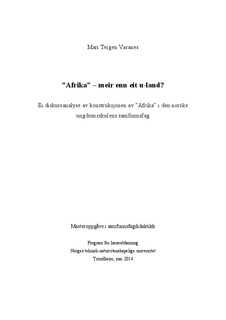| dc.contributor.author | Varanes, Mari Teigen | |
| dc.date.accessioned | 2017-05-09T08:10:56Z | |
| dc.date.available | 2017-05-09T08:10:56Z | |
| dc.date.issued | 2014 | |
| dc.identifier.uri | http://hdl.handle.net/11250/2441960 | |
| dc.description.abstract | I denne masteroppgåva vert konstruksjonen av ”Afrika” i to norske ungdomsskulars samfunnsfag undersøkt. Dette vert gjort gjennom ei diskursanalyse av lærar-og elevintervju, lærebøkene deira Makt og menneske og Kosmos, samt læreplanen Kunnskapsløftets samfunnsfagsdel. Informantgruppa består av fem lærarar og 14 elevar på 10.trinn. Bakgrunnen for oppgåva er ei personleg kritisk haldning til korleis ”Afrika” vert framstilt i media og hjelpeorganisasjonar, som eit ”land” prega av nød og elende. Dette vekka interessa for å finne ut korleis kontinentet vert konstruert gjennom skulens framstillingar, i ungdomsskulens tre samfunnsfag. Hensikta med oppgåva er å skape ein bevissthet rundt korleis me omtalar og forstår ”Afrika”, og kva mønster som ligg til grunn for akkurat denne forståinga. Gjennom undersøking av empirigruppenes meiningar om læringsintensjon, undervisningspraksis og konstruksjonar av ”Afrika”, er nokre diskursive mønster avdekka. Nød og elende dominerer ungdomsskulens konstruksjonar av ”Afrika, og desse konstruksjonane vert til gjennom ei samanlikning av ”oss”, knytt til element som levekår, befolkningsvekst og styresett. Eit etnosentrisk verkelegheitsbilete, der ”Afrika” heng etter ”oss” i utviklinga, vert slik skapt. Desse funna vert vidare knytt opp mot postkolonial teori, og det viser seg at mønster frå kolonial ideologi stadig pregar konstruksjonane av ”Afrika”, om enn i noko nye former. Elles viser funna at ei sterk ansvarskjensle for ”Afrika” er til stade. ”Afrika” heng etter i utviklinga på grunn av måten ”dei” er utnytta på tidlegare. Då ”me” er kome lenger i utviklinga, er det ”vårt” ansvar å hjelpe ”Afrika” opp mot ”vårt” nivå. Det finst stemmer i materialet som kritiserer denne einsidige måten å konstruere ”Afrika” på, og som etterspør eit større mangfald i framstillingane. Det vert imidlertid med kritikken. Framstillingar som viser eit større mangfald,er knapt synlege. I den norske ungdomsskulens samfunnsfag er ”Afrika” først og fremst interessant som eit offer for kolonisering, utnytting, nød og fattigdom –eit offer ”me” må redde. | nb_NO |
| dc.description.abstract | This thesis deals with the construction of ”Africa” in social studies in two Norwegian secondary schools. It is done through a discourse analysis of teacher-and student interviews, their textbooks Makt og menneske and Kosmos and the curriculum Kunnskapsløftets section about social studies. The group of informants consists of five teachers and 14 students in 10thgrade.The reason for the choice of topic is a personal critical perspective on how “Africa”is portrayed through media and aid organizations, as a “country” characterized by suffering and misery. This created an interest of finding out how the continent is portrayed in school, in the subject of social studies. The purpose of this thesis is to create an awareness of how we understand and identify “Africa”, and what patterns that underlie this particular understanding. Through examining the the empirical groups' opinions about their learning intentions, teaching practices and constructions of “Africa”, some discursive patterns has been uncovered. Trouble and misery characterize the images of “Africa” in the secondary schools, and these images are constructed through a comparison of “us”, related to elements such as living conditions, population growth and governance. As a result of this, an ethnocentric image is created, where “Africa” is lagging behind “us” in development. These findings are further linked to post-colonial theory, and it turns out that patterns from a colonial ideology still is present today, though in some altered ways. The findings also showa strong feeling of responsibility for “Africa”. “Africa” is underdeveloped compared to us, because of the ways they have been taken advantage of in the past. Since “our” society is at a higher level of development, “we” have the responsibility to help “Africa” rise to “our” level. There arevoices within the data material criticizing the unbalanced way of constructing “Africa”, and demanding a greater diversity of representations. The focus of misery is criticized, but it ends with this criticism. Representations that actually addresses a larger diversity is barely visible. In the Norwegian secondary school’s social studies “Africa”is primarily interesting as a victim of colonization, exploitation, poverty and misery-a victim “we” must save. | nb_NO |
| dc.language.iso | nno | nb_NO |
| dc.publisher | NTNU | nb_NO |
| dc.title | "Afrika" - meir enn eit u-land? - Ei diskursanalyse av konstruksjonen av "Afrika" i den norske ungdomsskulens samfunnsfag | nb_NO |
| dc.type | Master thesis | nb_NO |
| dc.subject.nsi | VDP::Samfunnsvitenskap: 200::Pedagogiske fag: 280::Fagdidaktikk: 283 | nb_NO |
